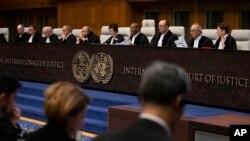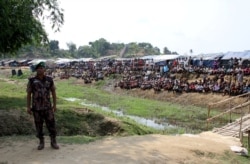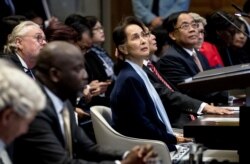The U.N.'s International Court of Justice has ordered Myanmar to "take all measures within its power" to prevent any acts of genocide against ethnic Rohingya Muslims, who fled the country amid a bloody military crackdown in 2017.
The court's ruling Thursday in The Hague came in response to a complaint filed last November by the West African nation of Gambia on behalf of the 57-nation Organization of Islamic Cooperation against Myanmar, accusing it of violating the 1948 Genocide Convention.
More than 700,000 Rohingyas fled across the border into Bangladesh in August 2017 to escape a scorched earth campaign launched by Myanmar’s military. The government said it was responding to attacks on security posts by Rohingya militants in northwestern Rakhine state.
A U.N. investigation concluded the campaign was carried out "with genocidal intent," based on survivors’ accounts of massacres, extrajudicial killings, gang rapes and the torching of entire villages.
In the massive Kutupalong refugee camp in southeastern Bangladesh’s Cox's Bazar district, jubilant cheers broke out as news of the favorable ruling spread. Refugees praised Gambia and the international community for bringing the matter before the court.
"We have seen a positive outcome from this decision,” said Mohammad Zubair, a Kutupalong resident and member of the Arakan Rohingya Society for Peace and Human Rights, an advocacy group. At home with roughly a dozen other people listening to live coverage of the court proceedings, he told VOA, “Myanmar’s government can’t deny what happened to the Rohingyas.”
Razia Sultana, coordinator of the Free Rohingya Coalition, welcomed the court’s ruling as the first step in securing a better future for the refugees and their compatiots in Myanmar.
“This is just the beginning of a historic journey for the Rohingyas,” said Sultana, who was honored with an International Women of Courage Award last April for her work with Rohingya refugees.
Bangladesh Foreign Minister AK Abdul Momen voiced his hope that the decision will make it possible for the hundreds of thousands of Rohingya refugees in his country to return home.
“This verdict is a victory for humanity, a milestone for human rights activists across nations. I hope the promise that Myanmar made to us to take back the Rohingya Refugees, they will keep their promise,” he said from Ecuador, where he is currently visiting.
A ‘real and imminent risk’
In reading the decision, the court’s president, Abdulqawi Ahmed Yusuf, said the Rohingya remained at a "real and imminent risk" of persecution at the hands of the military.
The court’s emergency provisional measures order Myanmar to prevent acts contributing to genocide; to ensure that its military and any allied armed groups do not commit acts of genocide or conspire against Rohingya; to preserve all evidence of crimes, such as mass graves; and to facilitate the repatriation of the Rohingyas back to Rakhine state.
The ICJ also ordered Myanmar to submit a report within four months on what actions it is taking to comply with the court's decision, and to submit follow-up reports every six months after that.
The ruling does not address the broader question of whether Myanmar committed genocide, which could take the court years to decide.
Myanmar defends itself
Myanmar’s foreign ministry turned down a request by VOA’s Burmese Service for reaction to Thursday’s ruling, saying "there will be no interview or any press encounter for this particular matter."
But the ministry later issued a public statement echoing findings of the Independent Commission of Inquiry — an international panel appointed by Myanmar’s government — which reported Monday that “there has been no genocide” of Rohingyas. “The Commission found that war crimes had occurred,” the statement said, “and those are now being investigated and prosecuted by Myanmar’s national criminal justice system.”
Myanmar's military was defended by civilian leader Aung San Suu Kyi during last month's ICJ hearings. Standing before the court in her official role as foreign minister, she reiterated her government's claim that the military was targeting Rohingya militants. Writing Thursday in the London-based Financial Times newspaper, she said Myanmar would investigate and prosecute civilians and military personnel who "may have participated in looting or burning villages." She also cited the commission’s finding of no genocide evidence.
Aung San Suu Kyi won the Nobel Peace Prize in 1991 for her pro-democracy stand against Myanmar's then-ruling military junta, which kept her under house arrest for 15 years until 2010. But her defense of the military's actions against the Rohingyas has stained her reputation as an icon of democracy and human rights.
Other reactions
The UN, along with some governmental bodies and rights groups, applauded the ruling.
UN Secretary-General António Guterres "welcomes the order,” according to a release from the international organization. It said he “strongly supports the use of peaceful means to settle international disputes.”
The European Union issued a statement insisting that Myanmar “ensure accountability for the gross violations of human rights perpetrated by some of its military and security forces. It must also ensure the protection of all civilians and safe and unfettered humanitarian access.” The EU noted, approvingly, that “the Court indicated provisional measures that go largely in the same direction."
"The growing global support for Gambia’s case raises the stakes for Myanmar to engage in the ICJ process in a meaningful way and change its approach to the Rohingya,” Param-Preet Singh, associate international justice director at Human Rights Watch (HRW), was quoted in a post Thursday by the rights group.
HRW also pointed out that the court’s order for protective measures automatically goes to the UN Security Council and is legally binding.
Aye Lwin, a Muslim interfaith leader who served on the Advisory Commission on Rakhine State, told VOA Burmese that the ICJ’s protective measures could have gone further. He didn’t see language requiring the government to cooperate with the UN’s Fact-Finding Mission on Myanmar or to allow its investigators access to sites of alleged atrocities to gather evidence.
"Myanmar’s government already admitted to using disproportionate force and human rights abuses in northern Rakhine state, but not to the scale of genocide,” he told VOA from Yangon.
There’s a high legal bar for proving genocide, which requires establishing intent. The only other successful ICJ prosecution under the 1948 Genocide Convention was initiated by Bosnia and Herzegovina against Serbia in 1993, with a court decision following four years later.
The Rohingyas, a Muslim minority group in Buddhist-majority Myanmar, have experienced decades of discrimination. They were excluded from a 1982 citizenship law that bases full legal status through membership in a government-recognized indigenous group. Myanmar considers the Rohingya illegal immigrants from Bangladesh, effectively rendering the ethnic group stateless.
Phillippe Sands, a University College London law professor and international law expert serving on the Gambia’s ICJ team, predicted the court’s decision “will have political consequences in terms of galvanizing support for the effort” to support Rohingyas.
“And a number of countries have indicated they are on the cusp of intervening in the case brought by the Gambia, including Western countries,” he told VOA. “So watch this space.”
VOA contributors included its Burmese and Bangla services, with reports coming from Rangoon, Myanmar, and Cox’s Bazar, Bangladesh, respectively. Mohammed Rukon Uddin of VOA’s Rohingya “Lifeline” radio program also reported from Cox’s Bazar.







